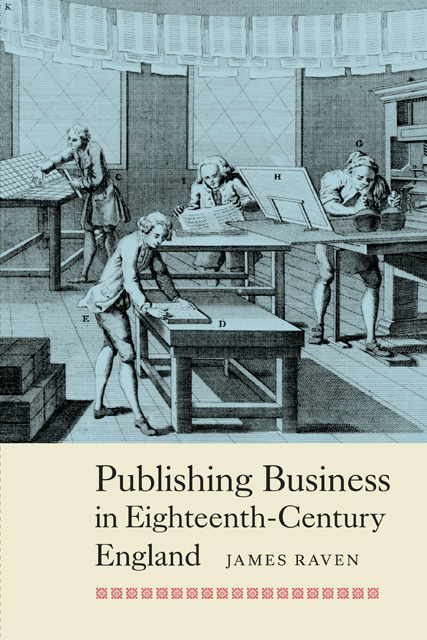Book contents
- Frontmatter
- Dedication
- Contents
- Acknowledgements
- Notes on Dates, Booksellers, Founts and Intaglio
- List of Abbreviations
- 1 The Mediation of the Press
- 2 England and the Uneven Economic Miracle
- 3 The Printed and the Printers
- 4 Serviced by Stationery and Printing
- 5 Printing and the City of London
- 6 Advertising
- 7 The Advertisers
- 8 Intelligence
- 9 Instruction and Guidance
- 10 Wider Discussion
- 11 Business, Publishing and the Gentleman Reader
- Conclusion
- Bibliography of Printed Sources
- Index
- Frontmatter
- Dedication
- Contents
- Acknowledgements
- Notes on Dates, Booksellers, Founts and Intaglio
- List of Abbreviations
- 1 The Mediation of the Press
- 2 England and the Uneven Economic Miracle
- 3 The Printed and the Printers
- 4 Serviced by Stationery and Printing
- 5 Printing and the City of London
- 6 Advertising
- 7 The Advertisers
- 8 Intelligence
- 9 Instruction and Guidance
- 10 Wider Discussion
- 11 Business, Publishing and the Gentleman Reader
- Conclusion
- Bibliography of Printed Sources
- Index
Summary
Print ensured that financial and commercial information was published and circulated with increasing regularity. As publishers’ methods and practices evolved during the eighteenth century, greater reliability was also claimed – and, in general, accepted. The gathering of financial and commercial information and the efficiency of its publication became increasingly specialist tasks. Above all, the nature and contemporary perception of ‘publication’ was of fundamental importance to the collection and dissemination of business and financial intelligence. Distinctions between private and public usage became increasingly important, much perhaps as today’s understanding and regulation of insider trading depends critically upon the procedures and rules governing information exchange. If distinctions became more important, however, it was not always because they were universally clearer: what to one person or owner or distributor of the information might be private, to another might be, in some form, ‘public’. Publication and what it meant remained a critical variable.
Both the agents employed and the sources used became increasingly familiar resources to the eighteenth-century newspaper proprietor, stationer-publisher and jobbing printer. In many ways newsprint was a form of jobbing, and a highly developed and popular form by the mid eighteenth century. Some ‘intelligence’ was produced in specific publications, addressed to particular mercantile or financial clients; other types of commercial information were published more generally. Categories of commercial and financial newspaper might be divided, generally, into three: first, reports or ‘currents’ of local economies, including general and specialized commodity price currents, foreign exchange rate currents, money currents and stock exchange currents; second, reports on overseas trade and shipping, including marine lists and general and specialized (‘small’) bills of entry; and third, combinations of two or more elements from both types of report and published in the same newspaper (an exchange rate current with a marine list, for example). To contemporaries, early ‘newspapers’ were certainly not only advertisers and were as much concerned with commercial and economic bulletins and news as they were about politics, either at home or abroad.
- Type
- Chapter
- Information
- Publishing Business in Eighteenth-Century England , pp. 149 - 179Publisher: Boydell & BrewerPrint publication year: 2014



